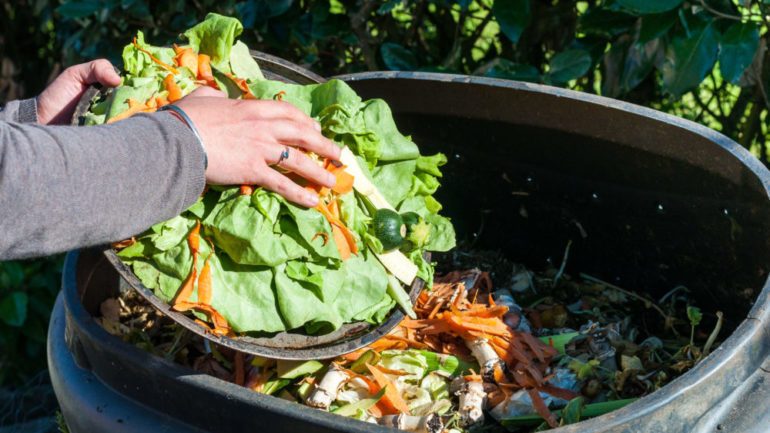Composting is a hot topic these days with lots of coverage in home and garden media regarding its far-reaching benefits for the earth as well as your own backyard. But what exactly is composting, and why should you do it? Here’s a quick primer spelling out the benefits, how to make it, and more.

What is compost?
Compost is made up of kitchen trash and food scraps. It contains microscopic organisms that work to aerate soil so that it provides more nutrients to plants. It can be applied to garden beds and lawns. Although it occurs organically in nature, by making it yourself, you can speed up the process.
Is it the same as fertilizer?
No, they are not the same. Fertilizer sits in the soil and quickly adds nutrients directly to plants. By contrast, compost releases slowly, feeding the soil with bacteria and fungi. Although it doesn’t change the pH, compost makes the soil act as if it has a healthier pH. Fertilizer is a short-term tactic; compost is a long-term strategy for improving soil and plants.
What does compost do?
Compost helps the soil store fertilizing nutrients, releasing them when needed, allowing regularly composted soil to need less fertilizer. By adding nutrients and helping the soil retain water, compost helps strengthen plants against diseases. Composting also may improve the flavor and nutrition of edible plants while also disposing of household trash. By redirecting up to 30 percent of regular household waste, composting significantly reduces methane gas byproducts linked to global warming.
What do I compost?
A successful compost mixture contains about one-third nitrogen-rich items to two-thirds carbon-based. Branches and stems, paper grocery bags, corn stalks, and even eggshells all contain carbon. Nitrogen-rich items include loose tea leaves or tea bags, manure, coffee grounds and filters, table scraps, and green lawn cuttings. All of these make the necessary enzymes. You can even add lint from your clothes dryer.
Is there anything I should not compost?
Meat, bones, and fish remains will attract pests. Also steer away from using diseased plants, perennial weeds, and pet droppings. Also, some fruit peels retain pesticides used by farmers.
What kind of container do I use?
Containers for keeping it outside can be purchased at a home improvement store or can be easily made. Check online for many DIY tutorials.
Where do I get it?
While it can be purchased, the most affordable and environmentally friendly way is to make your own using a home compost bin. The time it takes to make it varies, depending on the type of container and method. Using worms and turning the mixture can shorten the process to between three weeks and six months.
Does composting smell?
Yes and no. Ignore your compost pile and it may start to smell. Cut down drastically on odors by regularly turning your mixture. The oxygen added keeps it from becoming too moist and too pungent.
Do I have to use worms to do it?
No, you don’t need to add worms to a compost pile, although worms will help speed up the process. In other words, without worms, be patient. In outdoor settings, purchasing worms isn’t really necessary. Worms will find their way to your compost pile.
